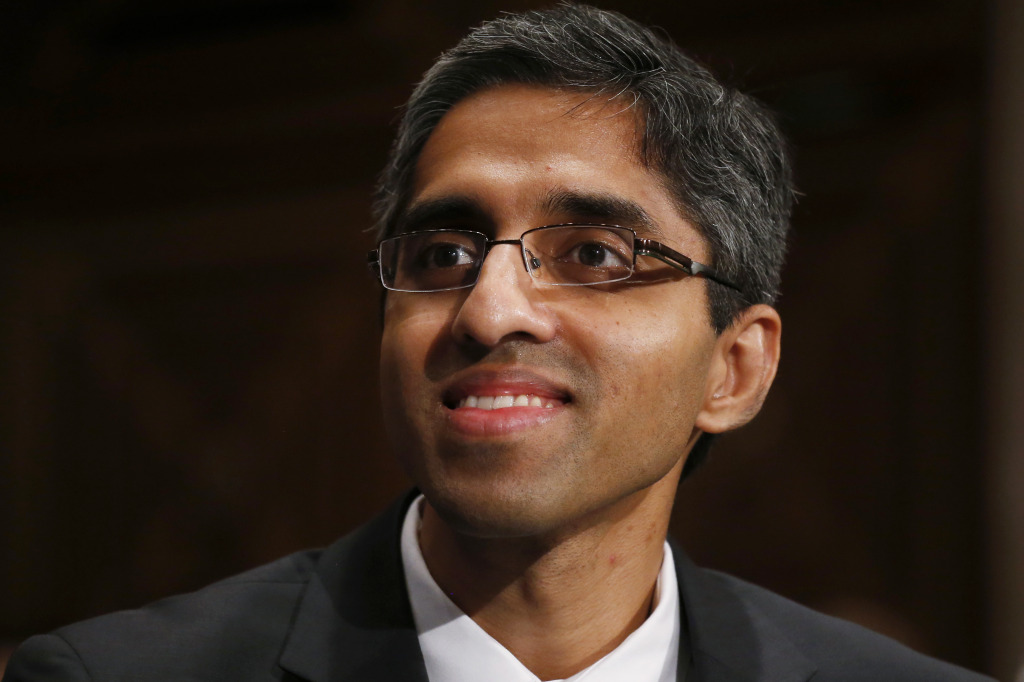
US Surgeon General Vivek Murthy, the nation’s youngest and first Indian American Surgeon General, was asked to resign on Friday by President Donald Trump, just a little more than halfway into his four year term.
Murthy served just over two years as US Surgeon General after being appointed by President Barack Obama in 2013; however, Murthy’s Senate confirmation faced stiff resistance due in part to Murthy’s public position that the nation’s epidemic of gun violence is a public health issue. Murthy was finally confirmed in December 2014 after over a year of political bickering and delays from Senate Republicans, and he took the office of US Surgeon General on December 18, 2014.
On Friday, Murthy posted a public statement on Facebook thanking his supporters and colleagues for his two years and four months in office.
While I had hoped to do more to help our nation tackle its biggest health challenges, I will be forever grateful for the opportunity to have served. The role of the Surgeon General is traditionally to share wisdom with others, but it was I who learned so much by listening to your stories in town halls and living rooms. In a remote fishing village in Alaska, a church in Alabama, an American Indian reservation in Oklahoma, a school in Virginia, and in so many other places, I watched the grit and grace with which our fellow Americans live their lives.
It is unclear why Trump had Murthy removed from his office as US Surgeon General. By all accounts, Murthy was a successful US Surgeon General, with clear vision for how he had planned to use the office to advance American public health.
Although Murthy’s nomination sparked controversy that he would use the office of the US Surgeon General as a “bully pulpit” to advance a gun control agenda, Murthy’s term as US Surgeon General was marked primarily by his efforts to stem the growing American option addiction epidemic. Murthy spearheaded the first US Surgeon General report on Alcohol, Drugs, and Health, publishing data on opiod use and e-cigarette sales as they related to substance abuse and addition.
Murthy also used the office of the US Surgeon General to address America’s obesity public health concern by urging policy-level changes. Rather than to focus exclusively on solutions that intervened at the level of individuals and their healthcare providers, Murthy encouraged a reframing of the obesity debate such that it viewed the issue as intersecting with economic status and food availability.
Murthy also dedicated time to trying to address the Flint water crisis, wherein local water were allowed to contain dangerously high levels of lead in a public health threat that predominantly affected the community’s Black residents. Murthy visited Flint twice to speak to local residents, healthcare providers and community leaders about the water crisis, and to help communicate the needs of the Flint community to the Obama administration in resolving it.
Finally, Murthy was serving as chair of the White House Initiative on Asian Americans and Pacific Islanders (WHIAAPI), a position he shared with former Education Secretary John King until King’s term ended with Trump’s election earlier this year. With Murthy’s removal from his post on Friday, the future of AAPI advocacy to the White House is uncertain.
WHIAPPI has served as a crucial line of communication between the AAPI community and the White House during the Obama administration, having led key initiatives to improve public health and political representation for AAPIs. Just hours after Trump’s inauguration, however, the WHIAPPI website vanished from the White House website and it has yet to reappear. Less than one month later, two-thirds of the President’s Advisory Commission on Asian Americans and Pacific Islanders — created by the same executive order that established WHIAPPI — resigned in protest of Trump’s anti-immigrant and xenophobic rhetoric. The Congressional Asian Pacific American Caucus (CAPAC) has also complained that the president has ignored their repeated requests to meet with him to discuss issues affecting the AAPI Community. The loss of Murthy from his position of leadership for AAPIs in the White House calls into question the Trump administration’s future commitment to working with the AAPI community during his presidency.
The office of the US Surgeon General is typically viewed as non-partisan and apolitical, and it is highly unusual for a president to call for the resignation of a US Surgeon General appointed by a previous president.
On Friday, Murthy’s successor — Acting US Surgeon General Rear-Admiral Sylvia Trent-Adams — was also announced. She previously served as deputy surgeon general, having dedicated most of her career to working in various positions in the Department of Health and Human Services. Trent-Adams has a Bachelor of Science in nursing and health policy, and a PhD from the University of Maryland-Baltimore, making her one of the only US Surgeon Generals not to have an MD. However, Trent-Adams’s long history of work on such issues as cancer, infection diseases, and HIV/AIDS-related public programs promise that her term may see a focus on public policy solutions for the treatment of chronic diseases.
